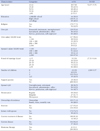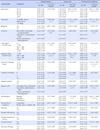Abstract
Purpose
This study aims to identify the relationship between marital intimacy, depression, and menopausal symptoms, and to provide basic data for the health promotion of middle-aged women.
Methods
A sample of 231 middle-aged women was recruited from four cities in Korea. The survey was conducted with participants using self-reported questionnaire from July 9 to November 11, 2011. The data were analyzed using descriptive statistics, t-test, ANOVA, and Correlation Analysis.
Results
There were differences of marital intimacy scores that were statistically significant in educational background (F=6.88, p=.001), religion (t=3.96, p<.001), own job (F=4.47, p=.012), own salary (F=3.01, p=.019), spouse's salary (F=6.72, p<.001), ownership of residence (t=4.00, p<.001), leisure with spouse (t=-5.05, p<.001), current treatment of disease (t=2.22, p=.027), and current disease (t=2.53, p=.012). Marital intimacy was correlated with depression (r=-0.61, p<.01) and menopausal symptoms (r=-0.39, p<.01).
Figures and Tables
References
1. Chang HK, Cha BK. Influencing factors of climacteric women's depression. J Korean Acad Nurs. 2003; 33:972–980.

2. Choi HJ. Stress, social support and depression of women following conjugal bereavement. Seoul: Ewha Womans University;1997.
3. Choi YU, Baek YM. The effects of family of origin health, marital intimacy, conflict between daughter-in-law and mother-in-law on marital satisfaction in married woman. J Rehabil Psychol. 2010; 17:145–164.
4. Cutrona CE. A psychological perspective: Marriage and the social provisions of relationships. J Marriage Fam. 2004; 66:992–999.

5. Deeks AA, McCabe MP. Well-being and menopause: An investigation of purpose in life, self-acceptance and social role in premenopausal, perimenopausal and postmenopausal women. Qual Life Res. 2004; 13:389–398.

6. Gold EB, Block G, Crawford S, Lachance L, FitzGerald G, Miracle H, et al. Lifestyle and demographic factors in relation to vasomotor symptoms: Baseline results from the study of women's health across the nation. Am J Epidemiol. 2004; 159:1189–1199. http://dx.doi.org/10.1093/aje/kwh168.

7. Han SH. A study on the menopausal symptoms, menopausal management and quality of life in middle aged women. Seoul: Ewha Womans University;2004. Unpublished master's thesis.
8. Hong CY, Yoon M. The effect of spirituality on happiness and depression of women in midlife. Korean J Woman Psychol. 2013; 18:219–242.
9. Jang SW, Chung HJ, Lee JY. The influence offamily-of-origin experiences and marital intimacy on parent-child relation. J Fam Relat. 2011; 15:93–111.
10. Kang SJ, Shin KR. Lifestyle and menopausal symptoms and depression of Korean women. Korean J Womens Health. 2002; 3:207–228.
11. Kim HJ. Comparison of the level of marital intimacy according to the level of stress among middle-aged women. J Korean Soc Matern Child Health. 2001; 5:123–136.
12. Kim JH. Relationship among sexual knowledge, frequency, satisfaction, marital intimacy and levels of depression in stroke survivors and their spouses. J Korean Acad Nurs. 2008; 38:483–491.

13. Kim MH. Menopausal symptoms according to sasang constitution and menopausal status among perimenopause women. Korean J Women Health Nurs. 2012; 18:28–37. http://dx.doi.org/10.4069/kjwhn.2012.18.1.28.

14. Kim MH, Choi YS. The effects of marital communication and marital intimacy on psychological well-being among middle-aged married men and women. J Korean Home Manage Assoc. 2007; 25:1–23.
15. Koo BJ. The influence of resilience, hope, marital intimacy, and family support on quality of life for middleaged women. J Korean Acad Psychiatr Ment Health Nurs. 2008; 17:421–430.
16. Lee KH. A measure of marital intimacy. J Korean Home Econ Assoc. 1995; 33:235–249.
17. Lee KH, Ok SW. A study on the marriage types and it's discriminant variables. J Korean Home Econ Assoc. 2002; 40:179–200.
18. Lee SS, Choi WH. The relationship between depression and stress in Korean middle-aged women. J Korean Soc Matern Child Health. 2007; 11:185–196.
19. Moss BF, Schwebel AI. Marriage and romantic relationship. Fam Relat. 1993; 42:31–37.
20. Pak BS, Kim YH. The influence of family-of-origin differentiation on marital intimacy: Mediating effects of identity and attitudes toward children. J Korean Home Econ Assoc. 2010; 48(9):1–11.

21. Park AY, Lee SH. The effects of Reiki self-healing on climacteric symptoms of middle-aged women. Korean J Woman Psychol. 2012; 17:95–114.
22. Park JH, Yoo YJ. The effect of family strengths and wives' self-esteem on depression among married women. J Korean Home Manage Assoc. 2000; 18:155–174.
23. Park SM. Defect of middle-aged women's social support, life stresses and self-esteem on depression. Busan: Dong-a University;2006. Unpublished master's thesis.
24. Proulx CM, Helms HM, Buehler C. Marital quality and personal well-being: A meta-analysis. J Marriage Fam. 2007; 69:576–593.

25. Radloff LS. The CES-S scale: A self-report depression scale for research in the general population. Appl Psychol Meas. 1977; 1:385–401.
26. Sarrel PM. Evaluation and management of postmenopausal patients. Female Patient. 1995; 20:27–32.
27. Son YJ, You MS. The related factors on the marital satisfaction in working married women. J Korean Soc Matern Child Health. 2008; 12:143–154.
28. Sung MH. The relationship between self-reported climacteric symptoms and self concept of middle-aged women. J Korean Soc Matern Child Health. 2001; 5:215–227.
29. Woo MS, Lim YJ. A study on the influencing factors ego identity of middle-aged men and women - focusing on marital communication and marital intimacy. J Soc Welf Dev. 2010; 16:393–415.
30. Yeo JH. Sex-role attitude and management of menopause among middle-aged women in a local area. J Korean Soc Matern Child Health. 2004; 8:199–210.




 PDF
PDF ePub
ePub Citation
Citation Print
Print






 XML Download
XML Download